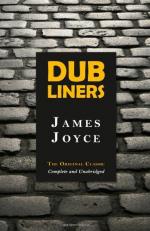“Pain? Not much,” answered Mr. Kernan. “But it’s so sickening. I feel as if I wanted to retch off.”
“That’s the boose,” said Mr. Cunningham firmly.
“No,” said Mr. Kernan. “I think I caught cold on the car. There’s something keeps coming into my throat, phlegm or——”
“Mucus.” said Mr. M’Coy.
“It keeps coming like from down in my throat; sickening.”
“Yes, yes,” said Mr. M’Coy, “that’s the thorax.”
He looked at Mr. Cunningham and Mr. Power at the same time with an air of challenge. Mr. Cunningham nodded his head rapidly and Mr. Power said:
“Ah, well, all’s well that ends well.”
“I’m very much obliged to you, old man,” said the invalid.
Mr. Power waved his hand.
“Those other two fellows I was with——”
“Who were you with?” asked Mr. Cunningham.
“A chap. I don’t know his name. Damn it now, what’s his name? Little chap with sandy hair....”
“And who else?”
“Harford.”
“Hm,” said Mr. Cunningham.
When Mr. Cunningham made that remark, people were silent. It was known that the speaker had secret sources of information. In this case the monosyllable had a moral intention. Mr. Harford sometimes formed one of a little detachment which left the city shortly after noon on Sunday with the purpose of arriving as soon as possible at some public-house on the outskirts of the city where its members duly qualified themselves as bona fide travellers. But his fellow-travellers had never consented to overlook his origin. He had begun life as an obscure financier by lending small sums of money to workmen at usurious interest. Later on he had become the partner of a very fat, short gentleman, Mr. Goldberg, in the Liffey Loan Bank. Though he had never embraced more than the Jewish ethical code, his fellow-Catholics, whenever they had smarted in person or by proxy under his exactions, spoke of him bitterly as an Irish Jew and an illiterate, and saw divine disapproval of usury made manifest through the person of his idiot son. At other times they remembered his good points.
“I wonder where did he go to,” said Mr. Kernan.
He wished the details of the incident to remain vague. He wished his friends to think there had been some mistake, that Mr. Harford and he had missed each other. His friends, who knew quite well Mr. Harford’s manners in drinking were silent. Mr. Power said again:
“All’s well that ends well.”
Mr. Kernan changed the subject at once.
“That was a decent young chap, that medical fellow,” he said. “Only for him——”
“O, only for him,” said Mr. Power, “it might have been a case of seven days, without the option of a fine.”
“Yes, yes,” said Mr. Kernan, trying to remember. “I remember now there was a policeman. Decent young fellow, he seemed. How did it happen at all?”




